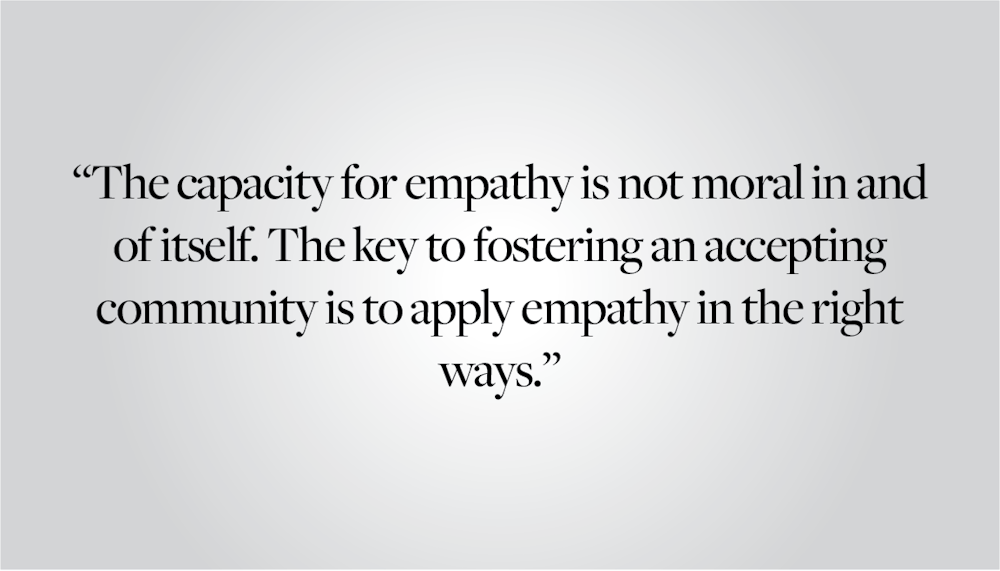One of the six values that Brown's Division of Campus Life lists on its website is “empathy.” The University specifies empathy to mean, “We create a culture of care for our students and colleagues by seeking to understand their perspectives, needs and experiences and acting with generosity and compassion.” While this definition of empathy is worth striving for, this use of the word “empathy” is imprecise.
Empathy is a psychological concept and considered an innate capacity. Unlike concepts like accountability and collaboration, empathy is individual and emotional. It does not require compassion or necessitate action. In fact, research indicates that empathy does not necessarily conform to conventional moral values like those listed by the Division of Campus Life. It is a multidimensional trait which can enhance our relationships, but should not be the determinant of our actions. Empathy should not be considered a moral principle, but instead a tool that can help us act morally.
Empathy can be split into three different components — emotional empathy, cognitive empathy and empathetic concern. Only the last component refers to compassion. Emotional empathy is the unconscious adoption of another’s emotional state, while cognitive empathy allows us to understand other perspectives. Empathy can manifest as a combination of these components, but they don’t all have to be present for one to be considered empathic.
For example, dark empaths are people with high empathy who also score high for narcissism, psychopathy or Machiavellianism. Individuals with these characteristics tend to use cognitive empathy to manipulate others to reach their own ends, but often lack compassion for other people. This phenomenon shows that empathy is not the opposite of self-interest, and should not be treated as such.
Another example of how empathy can commonly be used for self-gain is propaganda. Propaganda often manipulates emotion to disseminate messages. To do this, propagandists must understand their audience’s emotions, but this ability to cognitively empathize doesn’t always lead them to care for the needs of all people. Instead, they often use empathy to spread negative and hateful ideas.
In addition, while empathy is traditionally believed to improve understanding between diverse groups of people, it can just as easily exacerbate division. Humans’ ability to absorb others’ emotions probably developed to encourage cooperation between individuals within social groups, while those outside of those groups wouldn’t have been offered the same courtesy. Once people take a side in a conflict, they view their opponents through the perspective of that side. In a modern context, empathy has been shown to contribute to in-group out-group bias. For example, high levels of empathetic concern are correlated with strong partisan bias.
While this aspirational definition of empathy is well-intentioned, choosing that specific word shifts focus from concrete actions to better society to a character trait which naturally varies between different people. The capacity for empathy is not moral in and of itself. The key to fostering an accepting community is to apply empathy in the right ways.
One must actively choose to use and develop their empathy, as well as pursue the opportunities they are given to be empathetic. As Brown students, we have exceptional opportunities to learn about different cultures and interact with countless new people every day.
Being open to the perspectives and ideas of people different from you is a conscious decision which can guide empathy in a positive direction. With this in mind, maybe “openness” would be an apt replacement for “empathy.”
Megan Slusarewicz ’23 can be reached at megan_slusarewicz@brown.edu. Please send responses to this opinion to letters@browndailyherald.com and other op-eds to opinions@browndailyherald.com.
Correction: A previous version of this column incorrectly attributed the language about empathy to the University's mission statement. Instead, it comes from a list of the Division of Campus Life's values. The Herald regrets this error.





